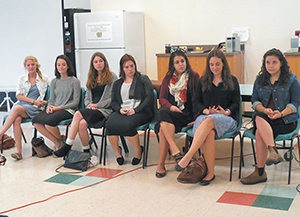
As a relatively young school, only recently has the Ma’ayanot Alumni Association begun to plan 10-year reunions (the first of which took place in 2010 for the school’s inaugural class of 2000). However, in planning these events it quickly became apparent that two gatherings would need to be planned for each 10-year reunion due to the impressive fact that approximately 15% of Ma’ayanot alumniae have made aliyah over the years. Indeed, the two-event reunion model was perfected this past June with the class of 2004 organizing its 10-year reunion such that the first hour of the American gathering corresponded to the last hour of the Israeli gathering, allowing for a group Skype session that enabled the entire class to celebrate together!
Because the Ma’ayanot student body is exceptionally Zionistic and feels a close personal connection to Israel, Ms. Sarah Gordon, Ma’ayanot’s Director of Student Activities, felt that Ma’ayanot students would benefit from supplemental Israel-related programming to help them more fully understand and unpack the difficult news that emerged throughout the summer as a result of Israel’s most recent war in Gaza. Toward this goal, Ms. Gordon planned a series of special Israel-themed programs to run throughout the fall semester.
The first program, which took place soon after the school year started, featured a presentation by Rabbi Yehoshua Konig, an IDF reserve soldier who left his family in New York to report for reserve duty in Operation Protective Edge this past summer. In speaking about his experiences as a squad commander during the war, Rabbi Konig was able to help the students understand why Israel needed to engage in fighting, what Israel accomplished, and how the army conducted its operations throughout the conflict. This information is invaluable in helping students understand and respond to international criticism that was, and continues to be, reported by many mainstream news sources.
In recognition of the fact that for many Ma’ayanot students the dream of aliyah takes hold while they are still in high school, Ms. Gordon organized a second program in which she invited seven Ma’ayanot alumni who have made aliyah to return to Ma’ayanot to participate in a panel discussion exploring post-high school aliyah options and challenges. At the start of the program, which was organized for the current senior grade, Ms. Gordon explained that the purpose of this program was to shine a light on the fact that “there is not just one path to aliyah,” and that “these are serious issues deserving of serious thought.”
Of the seven panelists, all of whom studied at an Israeli seminary for at least one year after graduating from high school, four, including Michal Fromowitz’ (’12), Racheli Fromowitz (’10), Sarit Forman (’10) and Rena Bierig (’12), completed sherut leumi (Israeli national service program for Orthodox girls) and have recently enrolled in Israeli colleges; one, Hannah Erdfarb (’11), serves as a Staff Commander in the IDF; and two, Nikki Sadek (’10) and Lottie Kestenbaum (’10), are nearing completion of Israeli undergraduate degrees.
After each panelist introduced herself and gave a brief description of her aliyah path and the challenges faced in pursuing her path, the floor was opened to questions from the students. When asked what motivated those who chose to do sheyrut leumi, Racheli Fromowitz explained that she always knew she wanted to make aliyah and she viewed sheyrut as a path that would allow her to culturally “fit in” while affording her a means of helping people. Rena Bierig added “I wanted to feel like I was in Israel and part of it. I figured let me first give to my country, and then let me start my life here.” Ms. Erdfarb echoed this theme of wanting to fully integrate into Israeli society as one of her motivations for serving in the Israeli army.
Ms. Kestenbaum pointed out, however, that even if a new olah does not do sheyrut or army service, she will still be warmly received by Israelis. “Whether you go to university or do sheyrut or army, people will be shocked–good shocked–like wow, you left New York. You will still learn Hebrew and you will still integrate into Israeli society.”
All of the panelists seemed satisfied with their decision to make aliyah, and all seemed impressively well-adjusted in Israel, but they did acknowledge that there were, and probably will continue to be, significant challenges along the way. These are important messages for any student considering making aliyah on her own at a relatively young age.
The final program in this series took place in early November when Mr. Zeev Ben-Shachar, Director of Israel Education at Jerusalem U, came to Ma’ayanot to discuss the fundamentals of Israel Advocacy, with an emphasis on responding to critiques of IDF tactics in Operation Protective Edge. Freshman Meira Prager commented that she thought the program was very helpful because Mr. Ben-Shachar “gave us ideas of how to respond to people who say things about Israel that aren’t true.” Senior Becky Schwartz added, “This program was really important for teenagers who are about to be on college campuses, because he gave us tools to defend Israel in a polite and rational way.”
Ma’ayanot students’ love for Israel is a given. These programs are an important means through which Ma’ayanot helps to ensure that its students’ love for Israel is enriched by an understanding of difficult political and social realities that Israelis live with on a daily basis. Only through such understanding can they give back to and help protect the country they love.










